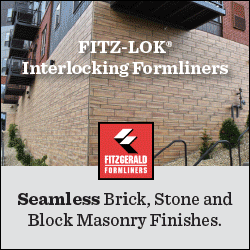Certified Advantage
By: Ed Sauter | Tilt-Up Concrete Association

Matthew McFarland - Photographer
Differentiating your company from the competition is critical to securing work. Although many assume price is the way to stand out, it’s a risky proposition to gain work solely on being
the lowest bidder. Many savvy contractors realize the importance of selling work on expertise and experience.
One way to demonstrate your proven performance is by obtaining third-party certification. Since 1999, the Tilt-Up Concrete Association (TCA), in conjunction with the American Concrete Institute (ACI), has offered the Tilt-Up Supervisor certification through ACI Committee C650. The program qualifies onsite personnel (individuals) as either a Tilt-Up Supervisor or Tilt-Up Technician. The success of the program validates the importance of certification and the need for a program of also evaluating and certifying the companies.
The Tilt-Up Certified Contractor program is for contractors unable to bid projects that require Precast/Prestressed Concrete Institute (PCI) plant certification. Although many have certified personnel on the project, architects wanted some assurance the processes and quality assurance practices employed by the tilt-up companies follow prescribed procedures.
“The goal of the TCA Company Certification Program is to provide a marketable and universally accepted verification program for assuring the experience, quality, and performance of tilt-up concrete products,” says Jim Baty, technical director of the TCA. “This certification program is designed to certify the companies that are ultimately responsible for the overall production and quality of the finished tilt-up concrete elements.”
One of the key tenets of the program is placing the burden on the TCA Certified Company to hire responsible individuals and subcontractors to ensure finished products are produced safely, and meet the project specifications and minimum standards of the program. The program also includes certification requirements of individuals and trades as a means of quality assurance.
“To address the broad range of companies in the tilt-up industry, TCA provides two levels of company certification,” says Baty.
The first level, General Tilt-Up Contractor, is for a company that complies with the certification requirements and is able to document successful completion of at least 15 projects (or at least 10 projects with at least 300 panels total) in the last five years. Architectural Tilt-Up Contractor, the second level, requires the company to meet all of the General Tilt-Up Contractor level requirements and also provide additional evidence of successful completion of at least four different types of specialty finishes, which include the following:
- Exposed aggregate
- Thin brick
- Curved panels
- Formliners
- Integrated color
- Extensive reveal
Companies must submit owner or architect references attesting to successful performance; demonstrate compliance with the work experience requirements; identify ACI/TCA Certified Tilt-Up Supervisors and Technicians; show proof of quality assurance documentation; show proof of insurance coverage requirements; adhere to a code of conduct; and complete an onsite audit.
To learn more about the TCA Company Certification program, visit www.tilt-up.org/certification.
SOURCE | Concrete Construction








